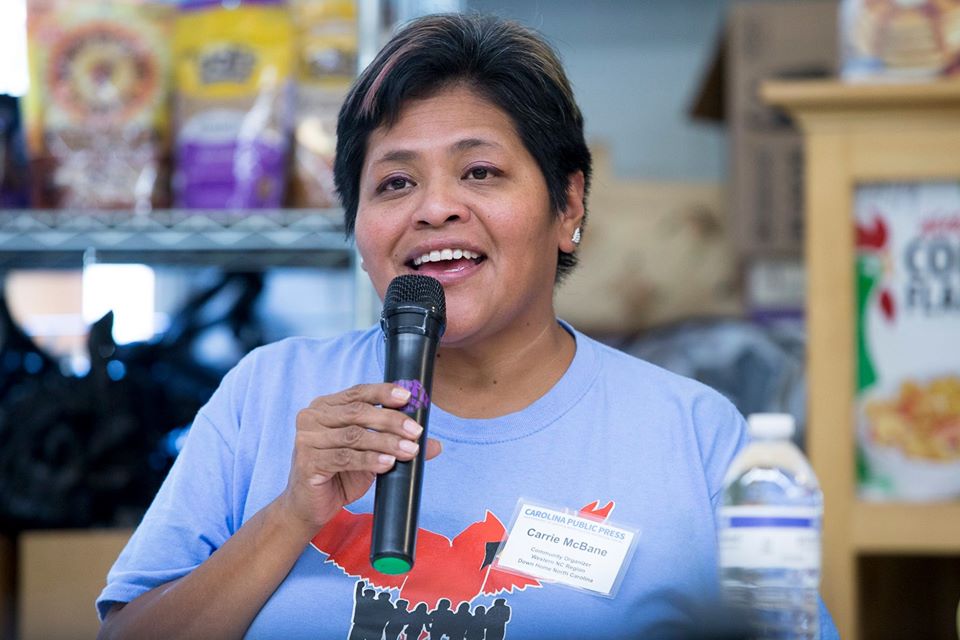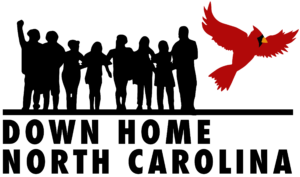
It seems like a lot of working people are really struggling to make ends meet in Jackson County and the surrounding areas. Why is that?
Down Home members, including myself, still struggle to make ends meet because the federal minimum wage was set at $7.25 an hour back in 2009 and it has not grown with the cost of living– This has allowed poor and working-class people to languish in poverty and near-poverty while monetary breaks for the extremely wealthy are considered normal.
Legislation over the last 11 years shows the extreme disconnect between what our elected officials think is an acceptable standard of living and the actual reality faced every day, by me and you.
How do people make ends meet if they aren’t being paid enough at their jobs?
Anyone who lives paycheck to paycheck has absolutely skipped or extended bill pay dates, robbed Peter to pay Paul, gone to the pawn shops or loan places… These coping mechanisms are happening among many of us but we don’t discuss them because it is or can be extremely shameful to vocalize such sufferings in a country that blames poor people for being poor. But a lot of these strategies we have to employ to make ends meet don’t allow us to get ahead and trap us further– We need to have an open and honest conversation about what is happening. Down Home wants to start that conversation in here in the North Carolina mountains.
What are the jobs like in Jackson County?
That’s a multidimensional question, but I think it’s safe to say that the customer service industry is a living, breathing beast of its own nature. Fast food, waitressing, housekeeping, farm work, and other low wage jobs are hard work and they are compensated very poorly.
The town of Sylva, for example, has a large amount of fast food businesses and restaurants- that’s where most of the job growth is. While diversity is key to our tourist industry, it also brings with it the overcrowding of “convenient” food sources that don’t offer a living wage or employer sponsored health care coverage.
To work in the service industry you have to have the ability to enter another person’s space, with the intention of serving them — an action in and of itself that is a double edged sword, takes courage, and takes good communication. All service workers bring learned and natural abilities to the table; if we are trained properly, with compassion and consistent supervision, any shift can be successful, even with hiccups along the way. It takes a lot of skill to be good in the industry. But it’s hard work, exhausting work, necessary work– but at the same time, it doesn’t provide stability or adequate compensation and isn’t valued.
Some people say that a minimum wage is not supposed to support a family, but is for younger or single people. Is that realistic in Jackson County?
The federal minimum wage has only increased by $2.10 over a 23 year period, from $5.15 a hour to $7.25. Does that seem like a realistic transition based on our economy and capitalistic tendencies today? Nowhere in the country can someone working full time at minimum wage pay for a two-bedroom apartment. It’s just not a realistic wage.
Maybe low pay like that is fine for a high school student who is picking up shifts for spending money or getting ready for college, but that is no longer the reality of who is working these sorts of jobs. The truth is, nearly half of all American jobs are low-wage jobs: These aren’t jobs you work for a few years and then advance out of, these are the jobs that are available across the country, including in places like Jackson County. So, parents, people with health conditions, older folks… everyone is going to work them.
What sorts of jobs do Down Home members in Jackson County work?
Down Home members work a hodgepodge of different jobs but they include a lot of students working part-time to get through school, social workers/counselors, and service industry workers as well as retired folks. Nearly all of our membership has experience in low-wage jobs. We know what it is like and that is why we are organizing.
Why did Down Home start a Living Wage Campaign in Jackson County?
One of our members originally brought up concerns about wages at one of our meetings and the members in attendance agreed that this was a majorly important and overlooked concern for our community. Likewise, when we were knocking on doors in the county, wages were cited again and again as a primary concern– especially how wages haven’t kept up with the cost of living here. We listen to what community members are telling us needs to change, so we knew we needed to organize around this issue– everyone agreed.
We knew some employers were doing a good job and saw the value in caring for their employees and providing them with a living wage. We thought a good way to raise awareness about this issue would be to celebrate and honor them.
How are Down Home members involved in the Living Wage Campaign? What do they do?
Across all our chapters in North Carolina, local Down Home members determine what issues matter most to their community and determine how they want to organize and respond to them. Down Home members here in Jackson County identified wages as a central issue and determined a way to respond through our Living Wage Certification program. Local Down Home members hit the pavement in Sylva’s downtown and outlying areas to approach local businesses about wages. We had intentional conversations about how the employers operate and asked if they’d consider becoming a Living Wage Certified Employer to help support the community and make Jackson County strong. The response, so far, has been really encouraging.

What does it mean for a business to become a Living Wage Certified Employer?
Becoming a Living Wage Certified Employer means that the business recognizes and acknowledges that local residents are valued and important to the local workforce and economy. The business has to want to make sure their employees are making enough money to provide for themselves and their families. If an employer can offer a living wage, then the employee is less likely to have to tap into private resources or government programs to help sustain themselves. This is a win-win for everyone.
Going through the certification process with Down Home means that the employers meet certain criteria and can prove that they provide the appropriate wages to all their employees.
Down Home works with our excellent partners at Just Economics in the certification process and we use their formulas and criteria to determine if a business qualifies and to help get businesses up to that living wage.
As basic needs for employees increase, the living wage has to increase to keep up with inflation and the realistic costs of living. A living wage really only covers housing, food, healthcare, and transportation– basic necessities, just so people can make ends meet.
How is a living wage determined?
Our partners at Just Economics calculate a living wage at 210% of the federal poverty guidelines, rounded to the nearest nickel. The wage rate is different for every county in North Carolina and is based on the Universal Living Wage Formula which is directly related to the cost of housing in that area. The rate for Jackson County is currently $12.60 an hour if the employer doesn’t provide healthcare coverage. If the employer does offer affordable healthcare coverage, then the rate drops to $11.10 an hour.
I want to reiterate that this really is a bare-bones wage– but we think it is a positive step in the right direction. Down Home advocates for a federal minimum wage increase to at least $15 an hour, but we deeply appreciate and honor the businesses that are working towards the goals. Any move toward parity is a step in the right direction.
How are local businesses responding to the program?
Local employers seem genuinely interested in learning more about the program and its benefits to the community. The response has been really very positive.
One concern I have is that there is a misconception among smaller businesses that the rate of pay that’s being offered is enough for their employees to afford a basic standard of living here in the county. Many people in the community are unaware that the minimum wage at $7.25 is only half of what needs to be earned per hour to be able to pay the power bill, water bill, rent, and access healthy food. Once we explain what the average rent cost is here and other factors, employers are deeply concerned about their employees’ well-being and understand how low the wages really are. Some don’t realize how stretched their employees’ budgets are, but once they learn this they want to be part of the solution. They know that their employees’ ability to have a healthy, balanced life ultimately benefits their business’s bottom line.
What benefits does a Living Wage Certification bring to a business?
The certification helps a business tangibly show, recognize, acknowledge and celebrate that the well being of employees is valued. We know from our own membership and talking to other local folks that we care about this issue– not just as employees, but also as consumers.
Furthermore, it benefits their bottom line. Having a healthy, well-paid workforce boosts morale and helps businesses communicate that they are trying to build real relationships with the community and their employees, and are here for the long-haul.
What is the process if a business wants to become Living Wage Certified?
Prospective clients either submit the application online or by submitting a paper application via a Down Home North Carolina member you know in the community. Our partners at Just Economics then review the information and look into the business. Once that is completed, Down Home members review the information and the application, and vote to– hopefully– approve the certification.


